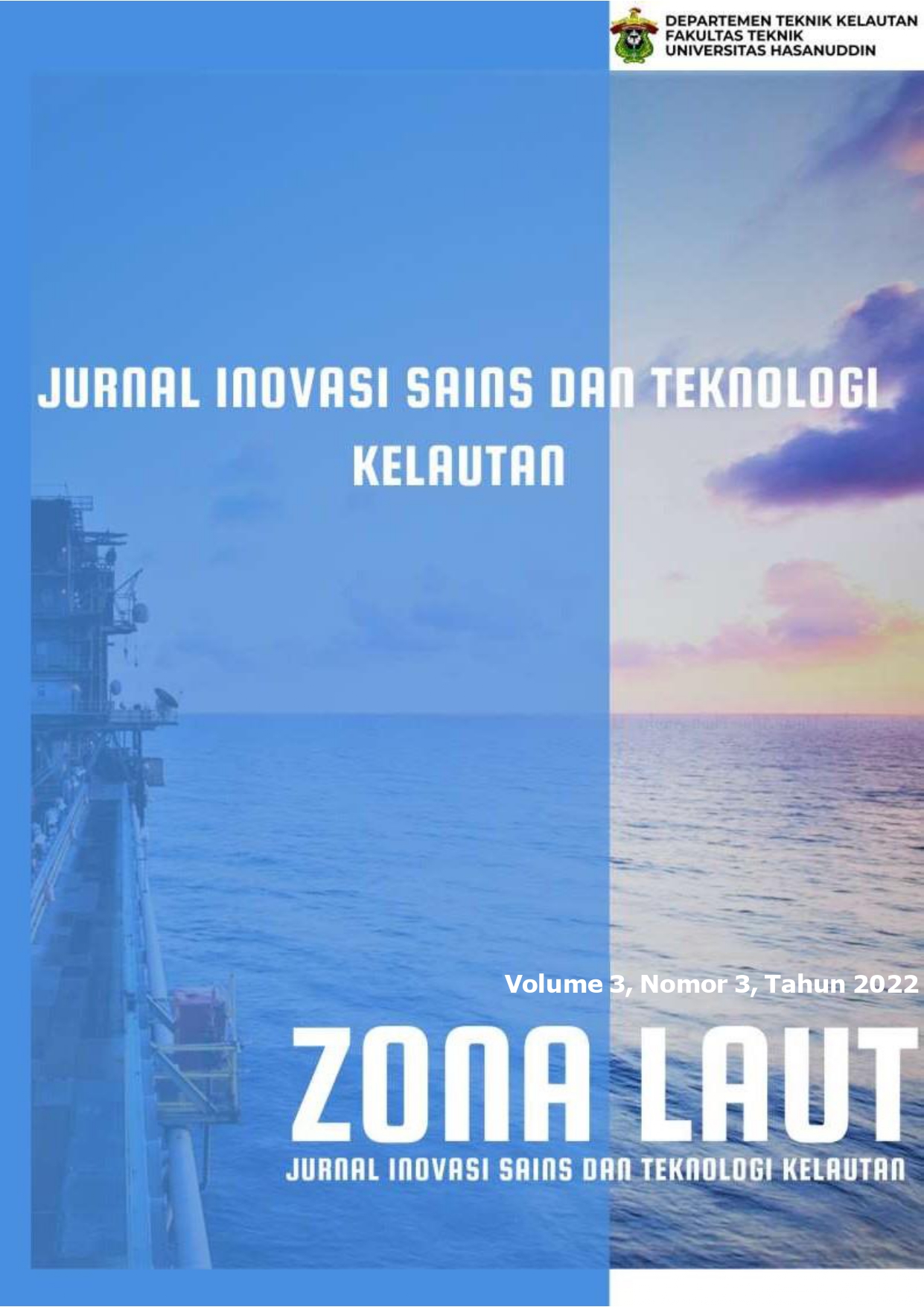Keel Cooler Effectiveness in Ship Main Engine Cooling System
DOI:
https://doi.org/10.62012/zl.v3i3.24307Keywords:
Heat Transfer, Keel Cooler Effectiveness, power/torqueAbstract
OT ship. Skylie is a type of tanker produced by PT. Samudra Marine Indonesia, in its construction, applies a keel cooler as a cooling device for the main engine propulsion of ships. This keel cooleris one of the new types of heat exchangers which is applied in the field of shipping. A cooling system using a keel cooler is a closed-circuit cooling system that is installed externally on the hull below the waterline. This study aims to determine the overall heat transfer value and the effect of changes in ship power/torque on the effectiveness of the keel cooler-type heat exchanger. The analysis uses two methods, namely CFD analysis and simulation using the Ansys CFX R20 application. Based on the results of calculations on several ship power/torque conditions, the largest heat transfer value is obtainednamely 5.599 x 10 5 W at 100% power condition and the lowest value is 5.055 x 105 W at 10% power condition. Meanwhile, the highest effectiveness value is 79.985% and the smallest value is 79.839%. So it can it was concluded that the use of the keel cooler on the OT ship. Skylie has met the standard value of effectiveness for a heat exchanger that is equal to 50%.Downloads
References
Abdul Chalim, dkk, 2017. Koefisien Perpindahan Kalor Total (U) Sistem Air-Etilen Glikol
Menggunakan Alat Penukar Kalor Shell and Tube 1-1.
Blokland Box Cooler Spesification, 2019, “Drawing of BoxCooler and Calculation”, lelystraat
AJ Sliedrecht, Holland
Bueche, F. J. Teori Fisika Edisi Kedelapan. Teori Fisika Edisi Kedelapan, Hal. 1–374. 2014.
Cat ELC, 2014, "Extended Life Coolant For Caterpillar And Original Equipment Manufacturer (OEM)
Diesel And Gasoline Engines", All rights reserved, Printed in USA. Caterpillar Marine Power System,
, “Marine Engine Selection Guide” Caterpillar Marine Asia Pacific Pte Ltd 14 Tractor Road
Singapore 627973/Singapore
Caterpillar Marine Power System, 2010, “Marine Engine Selection Guide” Caterpillar Marine Asia
Pacific Pte Ltd 14 Tractor Road Singapore 627973/Singapore.
Cengel, Yunus A, 2002, “Heat Transfer : A Practical Approach” Second Edition. McGraw-Hill Science
Engineering Math.
Engineering and operating guide, 2008, “for DOWTHERM SR-1 and DOWTHERM 4000 Inhibited
Ethylene Glycol-based Heat Transfer Fluids”, Trademark of The Dow Chemical Company, U.S., Canada,
Mexico.
Handoyo, E. A. Pengaruh Kecepatan Aliran Terhadap Efektivitas Shell-and-Tube Heat Exchanger.
(2), 86–90,2000.
Holman, J.P, 1997, “Perpindahan Kalor”, McGraw-Hil International Book Company, Boston, U.S.A.
Idawati, 2021. “Analisis Efektifitas Penukar Kalor U-Tube Bundle Pada Sistem Pendingin Mesin
Penggerak Utama Kapal”. Skripsi Teknik Sistem Perkapalan Universitas Hasanuddin.
K. Anwar, “efektivitas alat penukar kalor pada sistem pendingin generator plta.”
Lestari Puji Utami, 2011, “Analisa Perancangan Cooler Jenis Shell And Tube Heat Exchanger Pada
Mesin Nachang Tipe 2105A-3”, Skripsi Teknik Sistem Perkapalan Universitas Hasanuddin.
M. l. setyana, “1200gt dengan menggunakan sistem keel cooler,” pp. 1–13.
Muhammad Aidil Hikma, 2021. “Kinerja Penukar Kalor Tipe U-Tube Bundle Terhadap Sistem
Pendingin Mesin Bantu Kapal”. Skripsi Teknik Sistem Perkapalan Universitas Hasanuddin.
Oliver, J. Journal of Chemical Information and Modeling, 53(9),
–1699. https://doi.org/10.1017/CBO9781107415324.004, 2013.
Ozisik, M. N. 1985, “Heat Transfer”, McGraw-Hil International Book Company, Wiley, New York, U.S
Downloads
Published
How to Cite
Issue
Section
License
Copyright (c) 2022 Syerly Klara, Muhammad Iqbal Nikmatullah, Muhammad Faizal

This work is licensed under a Creative Commons Attribution 4.0 International License.
Allow anyone to modify, improve, and make derivative works, even for commercial purposes, as long as they credit to you for the original work.





























